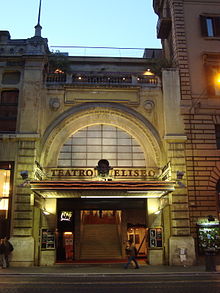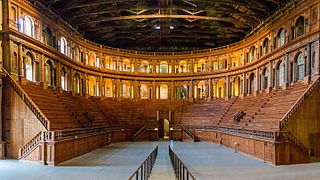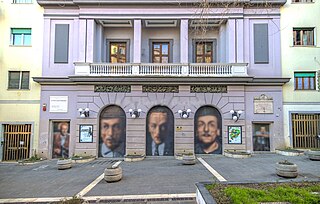You can help expand this article with text translated from the corresponding article in Italian. (May 2015)Click [show] for important translation instructions.
|

The Teatro Eliseo (literally "Eliseus Theater") is a theatre located in Rome, Italy.
You can help expand this article with text translated from the corresponding article in Italian. (May 2015)Click [show] for important translation instructions.
|

The Teatro Eliseo (literally "Eliseus Theater") is a theatre located in Rome, Italy.
Initially named Arena Nazionale ("National Arena"), the open-air theater was built of wood in 1900. In September 1910, the new "Apollo Theater" built in stone was inaugurated. The artistic program reflected the fashions of the time: operetta and variety shows alternated with opera. Two years later, its ridotto was detached and operated separately as a nightclub. The rest of the theater was renamed into Teatro Cines, a venue for film shows and a few operettas. In 1918, the theater got its present name. [1] [2]
Over the years the theater took on increasing importance, up to undergoing a makeover in 1938 that decreed its current appearance. [1]
In March 2020, the theater was closed. In December 2023, the Lazio Region announced that it would purchase the theater but then the deal was cancelled. [3] [4]

Associazione Sportiva Roma is a professional football club based in Rome, Italy. Founded by a merger in 1927, Roma has participated in the top tier of Italian football for all of its existence, except for the 1951–52 season. Roma has won Serie A three times, in 1941–42, 1982–83 and 2000–01, as well as nine Coppa Italia titles and two Supercoppa Italiana titles. In European competitions, Roma won the Inter-Cities Fairs Cup in 1960–61 and the UEFA Europa Conference League in 2021–22, while they finished runners-up in the 1983–84 European Cup, the 1990–91 UEFA Cup and the 2022–23 UEFA Europa League.

Società Sportiva Lazio is an Italian professional sports club based in Rome, most known for its football activity. The society, founded in 1900, plays in the Serie A and have spent most of their history in the top tier of Italian football. Lazio have been Italian champions twice, and have won the Coppa Italia seven times, the Supercoppa Italiana three times, and both the UEFA Cup Winners' Cup and UEFA Super Cup on one occasion.

Stadio Olimpico, colloquially known as l'Olimpico, is an Italian multi-purpose sports venue located in Rome. It is the largest sports facility in Rome and the second-largest in Italy, after Milan's Stadio Giuseppe Meazza, seating over 70,000 spectators. It formerly had a capacity of over 100,000 people, and was also called Stadio dei Centomila. It is owned by Sport e Salute, a government agency that manages sports venues, and its operator is the Italian National Olympic Committee.

The Teatro dell'Opera di Roma is an opera house in Rome, Italy. Originally opened in November 1880 as the 2,212 seat Costanzi Theatre, it has undergone several changes of name as well modifications and improvements. The present house seats 1,560.
The culture of music in Rome is intensely active. The venues for live music include:

The Teatro Quirino is an opera house in Rome opened in 1871. It hosted the premiere of Pietro Mascagni's operetta Sì.

The Teatro San Cassiano was the world's first public opera house, inaugurated as such in 1637 in Venice. The first mention of its construction dates back to 1581. The name with which it is best known comes from the parish in which it was located, San Cassiano, in the Santa Croce district (‘sestiere’) not far from the Rialto.
This page details football records and statistics in Italy.

Arnoldo Foà was an Italian actor, voice actor, theatre director, singer and writer. He appeared in more than 130 films between 1938 and 2014.

Teatro Farnese is a Renaissance theatre in the Palazzo della Pilotta, Parma, Italy. It was built in 1618 by Giovanni Battista Aleotti. The idea of creating this grand theater came from the Duke of Parma and Piacenza Ranuccio I Farnese. It was part of the complex of the Ducal Palace of Parma. The theatre was almost destroyed by an Allied air raid during World War II (1944). It was rebuilt and reopened in 1962.
Daniele Scattina is an actor, director and writer. Graduate at "Il Mulino di Flora" theater school in Bologna directed by Perla Peragallo and Leo de Berardinis.

The Teatro Petruzzelli is the largest theatre of the city of Bari and the fourth Italian theatre by size.

Teatro San Ferdinando is a theatre in Naples, Italy. It is named after King Ferdinand I of Naples. Located near Ponte Nuovo, it is to the southeast of the Teatro Totò in the western part of the neighborhood of Arenaccia. Built in the late eighteenth century, the seats are arranged in four box tiers, and the pit. It is most associated with Eduardo De Filippo and the productions of the 1950s under his direction. Closed in the 1980s and reopened in 2007, the San Fernando is managed by the Teatro Stabile of Naples.
The 2012–13 Serie A was the 111th season of top-tier Italian football, the 81st in a round-robin tournament, and the 3rd since its organization under a league committee separate from Serie B. It began on 25 August 2012 and ended on 19 May 2013. Juventus were the defending champions.

The Greek theatre of Syracuse lies on the south slopes of the Temenite hill, overlooking the modern city of Syracuse in southeastern Sicily, Italy. It was first built in the 5th century BC, rebuilt in the 3rd century BC and renovated again in the Roman period. Today, it is a part of the Unesco World Heritage Site of "Syracuse and the Rocky Necropolis of Pantalica".

The Teatro delle Dame, also known as the Teatro Alibert, was a theatre in Rome built in 1718 and located on what is now the corner of Via D'Alibert and Via Margutta. In the course of its history it underwent a series of reconstructions and renovations until it was definitively destroyed by a fire in 1863. In their 18th-century heyday, the Teatro delle Dame and its rival, the Teatro Capranica, were the leading opera houses in Rome and saw many world premieres performed by some of the most prominent singers of the time.

The Teatro Adriano, also known as Politeama Adriano and Cinema Adriano, is a cinema and former theatre located in Piazza Cavour, Rome, Italy.

The Teatro Flavio Vespasiano is the main theatre and opera house in Rieti. It was opened on 20 September 1893, after ten years of work and finishing touches; directed by architect Achille Sfondrini. It takes its name from the Roman emperor Titus Flavius Vespasian who was born in sabina.
Stefano La Colla is an Italian tenor who has given recitals and performed in opera internationally.

The Paganini Theater was an Italian theater, located in Genova. Inaugurated in 1855, it was situated on the central Via Caffaro. After less than a century of activity, between October 23 and 24, 1942, it was destroyed during the bombardments on Genova in World War II.
41°53′52″N12°29′19″E / 41.8979°N 12.4886°E